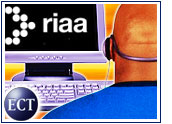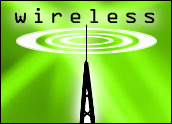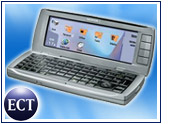
As students all across the United States were getting ready to head back to school, the Recording Industry Association of America (RIAA) was busy beefing up its prolonged attack on consumer fair use rights and emerging consumer technologies.
In a quietly-submitted letter dated August 16, 2004, lawyers for the RIAA warned the Federal Communications Commission (FCC) of a “real and imminent” threat, citing the recently introduced internet radio recording software Audio Xtract, which allows consumers to use their PC — just like a VCR for TV or a tape deck for AM/FM radio — to record internet radio broadcasts for personal use.
Over the past couple of years, the RIAA has aggressively pursued individuals who use the popular peer-to-peer file-sharing networks, bringing lawsuits against thousands in support of the powerful music industry it was created to protect and promote.
Their legal position in these civil suits might be less than crystal clear, however. A recent New York Times article asserts that downloading music from the internet is legal, stating that “…the fine print of those lawsuits makes clear that fans are being sued not for downloading but for unauthorized distribution.”
Legal vs. Illegal
So when the courts recently ruled that peer-to-peer technology is legal even if used for illegal purposes, the urgency of the RIAA’s other angles of attack was heightened, with the RIAA even more determined to use its political clout to change the laws.
On one front is the proposed Piracy Deterrence and Education Act, which would outlaw certain peer-to-peer file-sharing activities. On another, the RIAA wants the government to require “broadcast flags” on streaming digital content to gain control over what hardware devices can play the music.
Once encrypted with this broadcast flag, decoding a digital stream could then be considered a violation of the Digital Millennium Copyright Act (DMCA), a controversial law that provides little leeway for consumers, even for personal use.
HR 107 is a modification proposed to restore a fair-use provision in the DMCA, but there has been limited progress recently with upcoming elections and a strong lobbying effort by the Motion Picture Association of America (MPAA).
On a third front, the proposed “Induce Act” would hold manufacturers liable for products that allow illegal downloading or file-sharing. The opposition from groups like the Consumer Electronics Association and the Electronic Frontier Foundation has been predictably fierce.
Consumers in the Mix
And what are consumers up to amidst all this legal maneuvering? While Internet radio recording hardware and software — like Audio Xtract — have been available in some form for years, surging consumer interest in Internet radio threatens the current business model of the recording and music industries.
Analysts have pointed out that rather than pursue a solution that meets the time-shifting and device-swapping needs of today’s consumers, the industry continues to fight, preferring to legislate rather than innovate. The net result, at least according to some industry observers, is the continuing erosion of consumers’ fair use rights as granted by copyright law.
“For many consumers, that means just one thing,” said Gene Schenberg, Vice President of Business & Customer Development at Jambalaya Brands, maker of Audio Xtract. “Get it while you can.”





















































